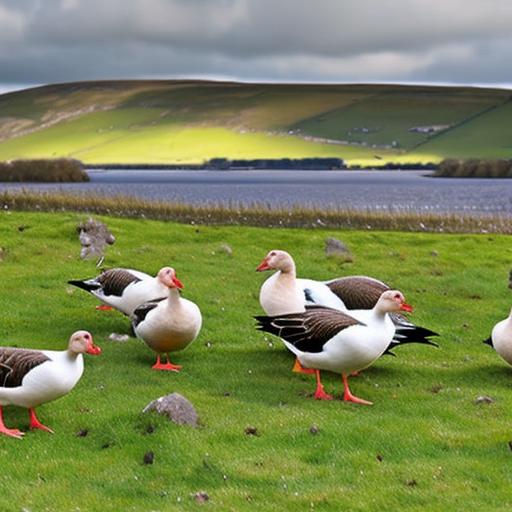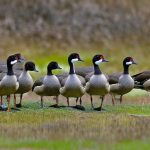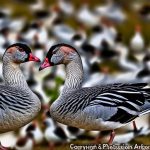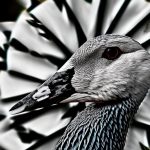Geese farming has a long history in Ireland, dating back centuries. The Irish have been raising geese for their meat and eggs, as well as for other products such as feathers and down. Geese are a popular choice for livestock in Ireland due to their adaptability to the local climate and their ability to thrive in the country’s lush green pastures.
Key Takeaways
- Keeping geese in Ireland is a popular and rewarding practice for farmers and homesteaders.
- Benefits of keeping geese include meat, eggs, feathers, and weed control.
- Choosing the right breed of geese depends on your needs and preferences, such as size and temperament.
- Housing and feeding requirements for geese in Ireland include access to water, shelter, and a balanced diet.
- Health and wellness considerations for geese in Ireland include vaccinations, parasite control, and proper hygiene.
The benefits of keeping geese as livestock in Ireland
One of the main benefits of keeping geese in Ireland is the high-quality meat and eggs they produce. Irish geese are known for their tender and flavorful meat, which is highly sought after by consumers. Additionally, their eggs are rich and flavorful, making them a popular choice for baking and cooking.
Another benefit of keeping geese is their natural pest control abilities. Geese are excellent grazers and can help keep grass and weed growth under control. They also eat insects and other pests, reducing the need for chemical pesticides on farms and homesteads.
Geese also provide a valuable source of fertilizer for gardens and crops. Their droppings are rich in nutrients and can be used to fertilize soil, improving its fertility and promoting healthy plant growth.
In addition to these benefits, geese are relatively low maintenance and easy to care for. They are hardy birds that can withstand the harsh Irish weather conditions, making them a suitable choice for farmers and homesteaders.
Choosing the right breed of geese for your farm or homestead
There are several popular breeds of geese in Ireland, each with its own unique characteristics. Some of the most common breeds include Toulouse, Embden, and Chinese geese.
When choosing a breed of geese, there are several factors to consider. First, you should consider your specific needs and goals. Are you primarily interested in meat production or egg production? Different breeds have different strengths in these areas.
You should also consider the climate and environment in which you will be raising your geese. Some breeds are better suited to colder climates, while others thrive in warmer conditions. It’s important to choose a breed that is well adapted to the local climate to ensure the health and well-being of your geese.
When it comes to purchasing geese in Ireland, there are several options available. You can buy geese from local breeders or farmers, or you can purchase them online from reputable sellers. It’s important to do your research and choose a reputable source to ensure that you are getting healthy and well-cared-for birds.
Housing and feeding requirements for geese in Ireland
Geese require suitable housing to protect them from the elements and predators. There are several types of housing options for geese, including traditional wooden sheds, portable shelters, and even converted barns or outbuildings.
When it comes to feeding geese, they have relatively simple dietary requirements. They primarily eat grass and other vegetation, so access to pasture is essential. In addition to grazing, geese can be supplemented with grains and commercial poultry feed to ensure they are getting all the necessary nutrients.
Water is also an important requirement for geese. They need access to clean, fresh water at all times for drinking and bathing. A shallow pond or pool can provide an ideal water source for geese.
Health and wellness considerations for geese in Ireland
Like any livestock, geese can be susceptible to certain health issues. However, with proper care and attention, many of these issues can be prevented.
Common health issues in geese include respiratory infections, parasites, and foot problems. It’s important to provide a clean and dry living environment for your geese to prevent these issues. Regular cleaning of their housing and regular check-ups by a veterinarian can help identify and address any potential health concerns.
Vaccinations and medications may also be necessary to keep your geese healthy. Consult with a veterinarian to determine the appropriate vaccinations and medications for your geese based on their specific needs and the local disease risks.
Regular check-ups and care are essential for maintaining the health and well-being of your geese. This includes regular grooming, such as trimming their wings and nails, as well as monitoring their overall condition and behavior.
Breeding and hatching geese in Ireland
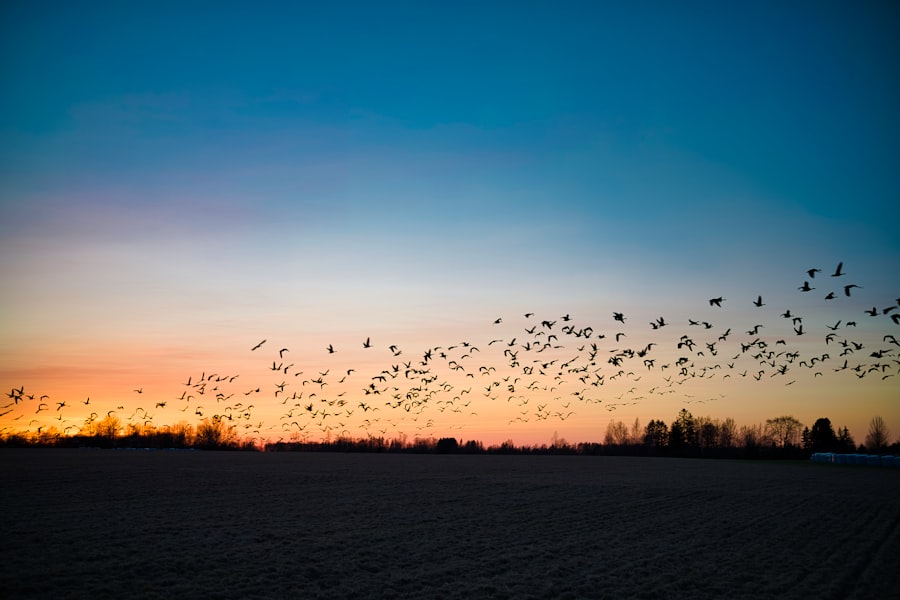
Breeding geese can be a rewarding experience, but it requires careful planning and preparation. Geese typically reach sexual maturity at around 2 to 3 years of age, although this can vary depending on the breed.
The breeding process involves pairing a male and female goose together. It’s important to choose healthy and compatible birds for breeding to ensure successful reproduction. Once paired, the female will lay eggs, which can be incubated to hatch goslings.
Incubation and hatching can be done naturally by the female goose or artificially using an incubator. Natural incubation takes around 28 to 35 days, while artificial incubation typically takes around 28 days. It’s important to provide a suitable nesting area for the female goose and monitor the eggs closely during the incubation period.
Caring for goslings requires special attention and care. They are delicate and vulnerable, so it’s important to provide them with a warm and safe environment. Goslings should be fed a specialized diet for young birds and provided with plenty of clean water.
Raising goslings and caring for young geese in Ireland
Raising goslings requires specific housing and feeding requirements. Goslings should be kept in a warm and dry environment, such as a brooder or heated shed, until they are old enough to withstand cooler temperatures.
Feeding young geese requires a specialized diet that is high in protein. Commercial poultry feed formulated for young birds can be supplemented with fresh greens and insects to provide a balanced diet. It’s important to provide clean water at all times and monitor their growth and development closely.
Socialization and training are also important aspects of raising young geese. They should be handled regularly to ensure they become comfortable with human interaction. Training them to come when called and respond to basic commands can also be beneficial for their overall well-being.
Selling geese and their products in Ireland
If you have a surplus of geese or their products, there are several options for selling them in Ireland. One of the most common ways to sell geese is for meat production. Irish geese are highly regarded for their quality meat, so there is a demand for locally raised birds.
In addition to meat, other products such as feathers and down can also be sold. Feathers can be used for crafts, fly tying, and other purposes, while down can be used for pillows, comforters, and other bedding products.
When selling geese and their products in Ireland, it’s important to comply with legal requirements. This may include obtaining the necessary licenses or permits, following food safety regulations, and ensuring that your products are properly labeled and packaged.
Challenges and solutions for keeping geese in Ireland
Keeping geese in Ireland does come with its challenges. The weather and climate can be unpredictable, with cold winters and wet summers. It’s important to provide suitable shelter and protection from the elements to ensure the health and well-being of your geese.
Predators can also pose a threat to geese, especially if they are free-ranging or have access to open pasture. Foxes, dogs, and birds of prey are common predators that may target geese. Installing secure fencing and providing adequate supervision can help protect your geese from predators.
Other challenges may include disease outbreaks, feed shortages, or other unforeseen circumstances. It’s important to have contingency plans in place and be prepared to adapt and adjust your management practices as needed.
The joys and rewards of keeping geese in Ireland
Despite the challenges, keeping geese in Ireland can be a rewarding and fulfilling experience. Many farmers and homesteaders in Ireland have shared their personal experiences and stories of the joys and rewards of raising geese.
From the satisfaction of producing high-quality meat and eggs to the pleasure of watching goslings grow and develop, keeping geese can provide a sense of connection to the land and a deeper appreciation for nature’s cycles.
In conclusion, geese farming in Ireland has a rich history and continues to be a popular choice for livestock. The benefits of keeping geese, such as high-quality meat and eggs, natural pest control, and fertilizer production, make them an attractive option for farmers and homesteaders. By choosing the right breed, providing suitable housing and nutrition, and taking proper care of their health and well-being, geese can thrive in the Irish countryside. Despite the challenges that may arise, the joys and rewards of keeping geese in Ireland are well worth the effort.
If you’re interested in keeping geese in Ireland, you might also find this article on poultrywizard.com about “How Long for Chicken Eggs to Hatch Naturally” helpful. Understanding the incubation period for chicken eggs can provide valuable insights into the breeding process and help you ensure the successful hatching of your geese eggs. Check out the article here to learn more. Additionally, if you’re looking for practical tips on housing your geese, poultrywizard.com offers a comprehensive guide on “A-Frame Chicken Coop” design, which can be adapted for geese as well. Find out more about it here. Lastly, if you’re wondering about the ideal size for a chicken coop door, this article on poultrywizard.com provides useful information that can be applied to geese housing as well. Discover more about it here. Happy reading and good luck with your geese!
FAQs
What are the benefits of keeping geese in Ireland?
Geese can provide a source of meat, eggs, and feathers. They can also help control weeds and pests in gardens and fields.
What breeds of geese are suitable for keeping in Ireland?
Breeds such as Toulouse, Embden, and Chinese geese are well-suited for the Irish climate and are commonly kept in Ireland.
What kind of housing do geese require?
Geese require a secure and dry shelter that protects them from the elements and predators. They also need access to a water source for swimming and drinking.
What do geese eat?
Geese are herbivores and primarily eat grass, weeds, and other vegetation. They can also be fed commercial poultry feed and occasional treats such as fruits and vegetables.
Do geese require any special care or attention?
Geese require regular access to water for swimming and drinking, as well as a balanced diet. They also need protection from predators and regular health checks.
Are there any regulations or laws regarding keeping geese in Ireland?
Yes, there are regulations regarding the welfare of geese and other poultry in Ireland. Owners must provide adequate housing, food, and water, and ensure that their birds are protected from disease and predators.
Meet Walter, the feathered-friend fanatic of Florida! Nestled in the sunshine state, Walter struts through life with his feathered companions, clucking his way to happiness. With a coop that’s fancier than a five-star hotel, he’s the Don Juan of the chicken world. When he’s not teaching his hens to do the cha-cha, you’ll find him in a heated debate with his prized rooster, Sir Clucks-a-Lot. Walter’s poultry passion is no yolk; he’s the sunny-side-up guy you never knew you needed in your flock of friends!

